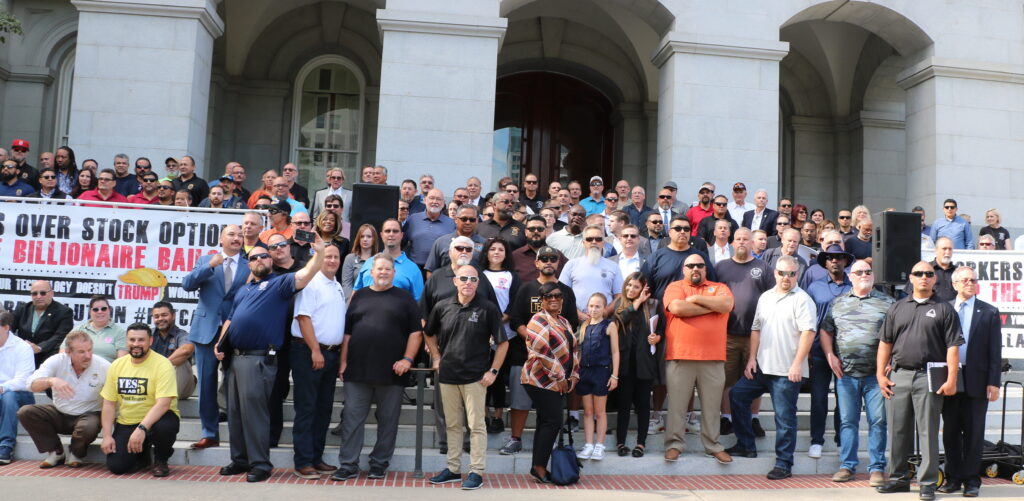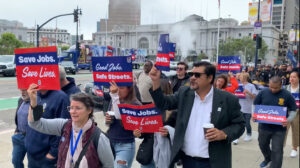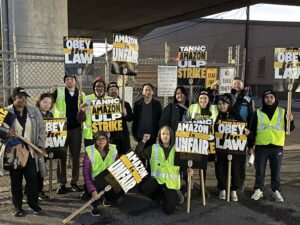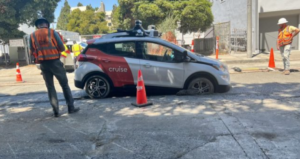Teamsters, Labor push landmark bill protecting gig workers over the finish line
September 30, 2019
For the past several months, Teamsters have traveled to Sacramento to lobby the state senate and assembly with one key goal: to pass AB5 and put a stop to worker exploitation in the “gig” economy. A million California workers are denied key workplace protections—including the minimum wage—because their employers falsely label them as independent contractors. But that practice will now come to an end as the legislature passed the bill and the governor signed it on September 18.
It’s not a new practice, but “gig economy” companies like Uber, Lyft, Doordash and Handy have taken the practice to new heights, claiming that they’re technology companies rather than taxi, delivery or repair companies. The result is that they undercut the competition, particularly union employers, that pay good wages, benefits, unemployment and social security.
“By approving AB5, the California legislature solidified our state’s position as the national leader on workplace rights, setting the standard for the rest of the country to follow,” said California Labor Federation Executive Secretary-Treasurer Art Pulaski in a statement. “The misclassification of workers creates a corrosive effect that ripples through our entire economy, undermining our laws to protect and support working people. AB5 is a powerful counter to the corporate greed and rampant exploitation that’s driving inequality across our state in emerging and traditional industries, alike.”
“Today, we are disrupting the status quo and taking a bold step forward to rebuild our middle class and reshape the future of workers as we know it,” bill author and Assemblyperson Lorena Gonzalez said in a statement. “As one of the strongest economies in the world, California is now setting the global standard for worker protections for other states and countries to follow.”
AB5 is based on a 2018 decision by the California Supreme Court that imposed a stricter test for whether a worker could be considered an independent contractor. Companies can’t call workers independent contractors if the work they do is central to the company’s mission or if the company substantially directs their work, the court ruled. The legislation will make enforcement significantly easier, but it also includes a lot of exemptions for professions such as doctors, lawyers, architects, engineers, accountants, insurance agents, hairstylists, and more.
The trucking industry and app-based companies like Uber and Lyft have been screaming for exemptions but so far, their efforts are in vain. “Trucking has some of the worst violators,” said Assemblywoman Lorena Gonzalez, the bill’s author. “We are not going to strip out employee protections.”
Other workers who will be covered by AB5 include janitors, construction workers, manicurists, strippers, and some in the tech industry. Being an employee means protections including the minimum wage, overtime, workers comp, sick leave, family leave, and more, in addition to employer payments for Social Security and Medicare. Companies also don’t pay payroll taxes on independent contractors, shorting the state of California by an estimated $7 billion a year on misclassified workers.
App-based companies like Uber, Lyft, and DoorDash tried to negotiate an exemption for themselves, but legislators held firm and the bill was passed and signed with limited exemptions for workers such as Real Estate Agents and hair stylists, who truly are independent contractors. However, those companies are threatening to pour $90 million into a campaign for a ballot measure exempting them, which could become a massive fight in 2020.
“Misclassification is an attempt to weaken the power of workers, including the thousands of truck drivers in California, who deserve a living wage and full rights as employees. The legislature and governor have taken a strong stand with workers who should earn a living wage and have the protections to which they are entitled,” Joint Council 7 President Dave Hawley noted.





